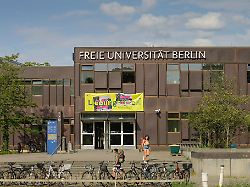Temporary house ban
Berlin university takes action after attack on Jewish students
February 9, 2024, 7:53 p.m
Listen to article
This audio version was artificially generated. More info | Send feedback
After the beating attack against Jewish student Lahav Shapira, the Free University of Berlin wants to make its campus safer. The suspect is perceived by many as a threat, the facility says. He is therefore no longer allowed to enter the area – at least for the time being.
After the attack on a Jewish student, the Free University of Berlin took action. The university announced that after the violent attack in Berlin-Mitte, which was allegedly anti-Semitic, the suspect was banned from entering the building to protect university members on campus. The house ban applies to the entire campus for three months and can be extended. Online teaching formats are not affected by the university’s decision, it said.
The Jewish FU student Lahav Shapira was hospitalized last weekend with broken bones in his face. A 23-year-old pro-Palestinian fellow student is said to have hit and kicked him on a street in Berlin-Mitte. The public prosecutor’s office assumes a targeted attack and an anti-Semitic background. The case has been shaking up the city for days and is also putting the management of the FU under pressure.
After the crime, FU President Günter Ziegler expressed his horror and condemned the crime. “Our condolences go out to the victim and his family. We wish him a quick and complete recovery,” said Ziegler, according to the statement. Unrestricted solidarity applies to all victims of anti-Semitic hostility and violence. “In view of the crime, the suspect would be perceived as a threat on the university campus,” said Ziegler. “In order to protect the members of the university and to ensure the peace of the university, the ban on entering the premises that has now been announced for an initial period of three months is essential.”
According to the university, around 40,000 people from more than 150 nations with different origins and religious affiliations study, teach, research and work at the university. “This diversity shapes the university’s self-image,” it said. “Humanity, respect and tolerance are the cornerstones of our community. Anti-Semitism of any form, racism and discrimination will not be tolerated.
